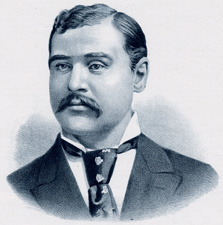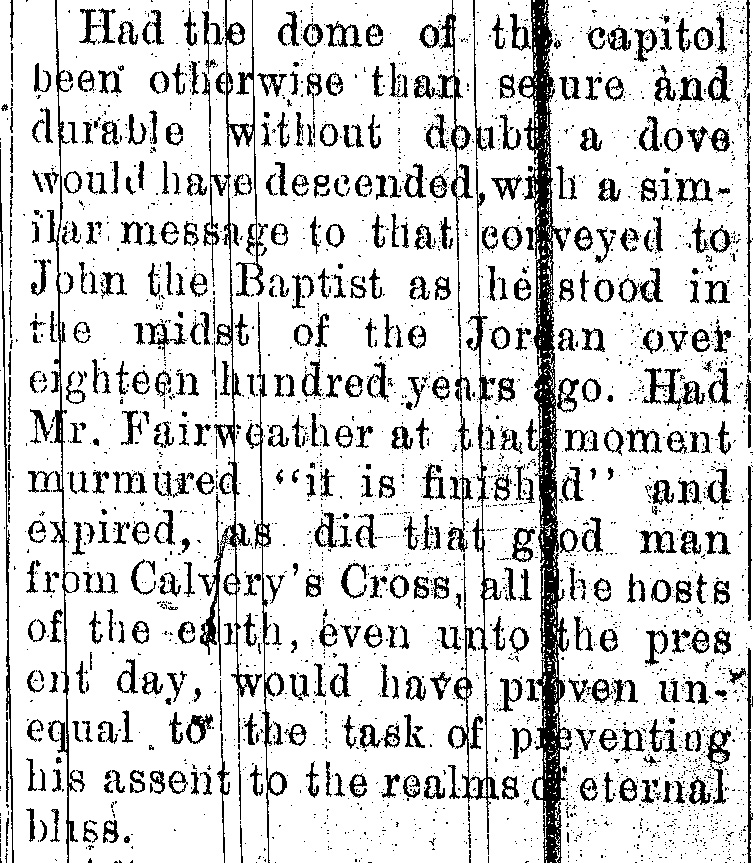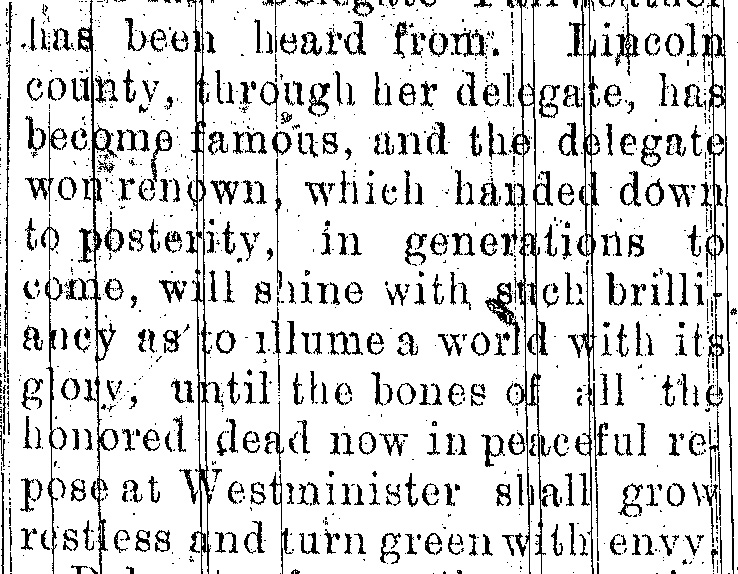Mr. Fairweather Goes to Olympia
 From the desk of Steve Willis, Central Library Services Program Manager of the Washington State Library:
From the desk of Steve Willis, Central Library Services Program Manager of the Washington State Library:
Although the word “snarky” wasn’t really used in 1889, the concept was there– as we shall see.
In this case study we should start with the 1889 Constitutional Convention held in Olympia, where delegates from across Washington Territory met in order to hammer out a guiding document. When I read through the WSL copy of The Journal of the Washington State Constitutional Convention, 1889, I find an entry for July 17 describing a proposition submitted by a generally quiet gentleman from Lincoln County with the literary name of Handford Wentworth Fairweather:
“Relating to Bribery of Officers. By Mr. Fairweather. Referred to Committee on Legislative Department.”
H.W. Fairweather, 37 years old, was a former railroad executive turned banker from Sprague. You might recall his name as a narrator in our blogpost about Amore de Cosmos.
Apparently Mr. Fairweather’s action at the Convention amused the folks back home. The random reel this week is from The Wilbur Register for July 26, 1889. They just don’t write political commentary like this these days. I have tried to keep the original spelling and punctuation as true as possible while still keeping it readable:
“At last Delegate Fairweather has been heard from. Lincoln county, through her delegate, has become famous, and the delegate won renown, which handed down to posterity, in generations to come, will shine with such brilliance as to illume a world with its glory, until the bones of all the honored dead now in peaceful repose at Westminister shall grow restless and turn green with envy.”
“Delegates from other counties might devote their entire attention to such unimportant, common place matters as schemes for state, county, and municipal government, legislative and executive powers, the bill of rights, revenue and taxation, or the judiciary to the exclusion of others of such vital importance that a state government formed without them would surely prove uninduring. No such neglect is to be charged to this renown member from Lincoln. To his fertile brain is to be ascribed the keystone plank of the constitution without which it never could have proven durable.”
“Mr. Fairweather has figured considerably in legislative and public affairs. In such matters his is the wisdom of experience. He has necessarily stood by, a disinterested spectator of course, and witnessed the corruption, bribery and dishonesty that creeps into legislative bodies, prostitutes public servants, pervades our elections and even contaminates railroad employees. Of course there are men who have taken to this state of things like ducks to water or swine to a swill barrel. But not so with Mr. Fairweather. Oh no! not he. He has revalted at the sight. His pure and lofty character became horrified at these spectacle and turned from them with loathing and disgust. That a nature such as Mr. Fairweather’s should grow restless while his country was polluted with such enormities is not to be wondered at. Indeed to his sensitive nature it was extremely cruel. Perhaps those acquainted with Mr. Fairweather have observed an anxious troubled expression lurking on his saintly countenance, but now, the cause of its existence having disappeared serenity and peace once more there reigns supreme.”
“There is a day distinguished from all others in the life of every man. Mr. Fairweather had his day in the territorial constitutional convention last week.”
“‘Mr. President,’ rang out in a clear tone, and the richness that sounded in that voice was conclusive to those who listened there was nothing of the spurious about it. The convention was at once hushed in rapt attention and the gaze of every member was directed toward the member from Lincoln county, who stood in his place, his towering symetrical form the impregnable fortress of the keenest sense of honor, while the frank, open countenance, for which he is noted, was directed at the presiding officer. The occasion will long remain fresh in the recollection of those who witnessed it as a momentus event. There stood Mr. Fairweather, The delicate flush on his pale cheeks proclaimed the humility, bashfullness and retiring reserve that had sought and found seclusion there. His large, black eyes, the realms of sincerity, whose borders of pearl like purity the ideal madonna has yet to equal, that appear as the entrance to caverns stored to overflowing with the gems of honesty and saintly integrity, that shown forth in a hallow of glory compared to the low, calculating, cunning discernable in the small, keen opticts of several surrounding colleagues.”

“Then when Mr. Fairweather sent to the clerk’s desk and had read a provision to be embodied in the constitution prohibiting bribery and bribe taking by public servants the blow of the mighty avenger of political corruption fell. Think of this great blessing, Mr. Fairweather secures to your future state, fellow citizens. The state of Washington is not to be contaminated by this form of public corruption because it will be prohibited by the constitution and to this member from Lincoln county is to be ascribed all honor and glory.”
“Every member present recognized the great importance of this provision. As Mr. Fairweather took his seat numerous were the glances of admiration directed toward him. For so far-reaching a stroke a statescraft he would have, without doubt, been the unanimous choice of the convention had a vote then and there been taken, for U.S. Senator. Still here and there were noticeable members not at all pleased. The good and righteous Judge Turner winced a little as his recollection was carried back to former campaigns and future necessities in Spokane county politics. President Hoyt closely scrutinized Mr. Fairweather to ascertain if anything of a personal nature was intended. Delegate Moore remembering the ‘personal explaination’ a heartless reporter had compelled him to make, by casting base reflections on his recently received consignment of Kentucky’s choicest brands, could not suppress a preceptable quivering of the lips, while Tom Griffiths, constantly on the look out, was not a little chagrined to think so favorable an opportunity to cover himself with glory and bask in the rays of public attention had escaped him.”
“Had the dome of the capitol been otherwise than secure and durable without doubt a dove would have descended, with a similar message to that conveyed to John the Baptist as he stood in the midst of the Jordan over eighteen hundred years ago. Had Mr. Fairweather at that moment murmured ‘it is finished’ and expired, as did that good man from Calvery’s Cross, all the hosts of the earth, even unto the present day, would have proven unequal to the task of preventing his assent to the realms of eternal bliss.”
“After so worthy an occurrence and historical event undoubtedly the convention immediately adjourned for the day in commemoration thereof, but upon this point our information saith not.”
H.W. Fairweather went on to be elected to the very first Washington State Senate and served one term. A essay he wrote about the history of the Northern Pacific Railroad can be found in the Washington Historical Quarterly v. 10, no. 2 (Apr. 1919).

